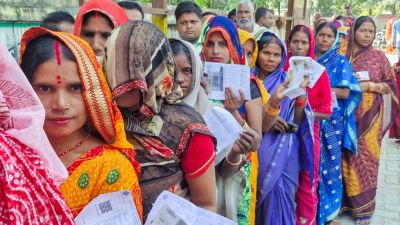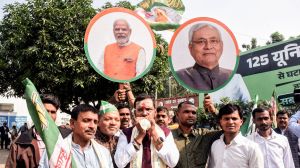Malaysian Indian row: PMs careful, there’s room yet for some quiet talk
After the Prime Ministers of India and Malaysia addressed over the weekend their respective domestic constituencies...

After the Prime Ministers of India and Malaysia addressed over the weekend their respective domestic constituencies, the two governments have a moment to take stock of the controversy over Kuala Lumpur’s treatment of its Indian minority and inject a measure of mutual restraint.
Prime Minister Manmohan Singh’s remarks were, by design, too general to give any offence to the Malaysian Government. His Malaysian counterpart, Abdullah Ahmad Badawi, in turn, made it a point to praise the contributions of Indian minority even as he denounced the accusations of “ethnic cleansing” levelled by the Hindu Rights Action Force.
“In our 50 years of independence, we never had any problems with the Indians. The Indians have played their role in being staunch supporters of the Malaysian Government,” Badawi said.
That the two prime ministers carefully avoided recrimination suggests there might be some room yet for a quiet bilateral engagement on the issue.
Despite the many irritants that have accumulated in recent years between India and Malaysia, New Delhi has no reason to forget the strong bonds that once united the national movements of the two countries and the deeper links between Indian and Malay cultures.
India is also acutely aware that the biggest loser from an escalating war of words between New Delhi and Chennai on the one hand and Kuala Lumpur on the other would be none other than Malaysia’s Indian community.
Ever since independence, New Delhi has drawn a careful line between the expression of natural empathy with the expatriate Indian communities and the dangers of a direct Indian intervention on their behalf.
As it dealt with the many problems of the Indian diaspora from East Africa to South Pacific, not to mention the sub-continent, New Delhi became conscious of the huge gap between easy rhetoric and the difficulty of changing ground reality in foreign lands.
New Delhi’s consistent advice to the Indian diaspora on becoming model citizens in their adopted countries was not an abstract one; it was based on the recognition that hot words from New Delhi would only queer the pitch for the Indian minorities.
The leaders of the Indian civil society must caution the HRAF leaders against excessive enthusiasm about internationalising their problems. Once the TV channels get bored with their cause and the human rights groups have said their piece, the Indian minority will have no option but to engage the Malaysian political system to improve its lot.
The HRAF activists, New Delhi is aware, belong to a new generation that is reacting in frustration against the failure of the traditional institutions like the Malaysian Indian Congress to stand up for their rights. Malaysia is no exception to the pattern in which majorities often push minorities into a ghetto by co-opting a few of their leaders.
For the HRAF, the answer lies in a genuine effort at building new political coalitions within Malaysia. Indians, who form 10 per cent of Malaysia’s population, are not alone in voicing their grievances against Kuala Lumpur’s “Bhumiputra” policy of positive discrimination in favour of the Malay Muslims. So do the Chinese who form nearly a quarter of Malaysia’s population.
As the ruling United Malays National Organisation converts Malaysia into a one-party state, many Malays too are getting restive. Days before the HRAF took to streets, a coalition of opposition political parties and non-government organisations rallied in thousands in Kuala Lumpur demanding electoral reform and political change.
Meanwhile, the former deputy prime minister Anwar Ibrahim, who was the designated successor of Malaysia’ strong man Mahathir Mohammed until the UMNO hounded him out, has openly criticised Kuala Lumpur’s treatment of its minorities.
Malaysia’s free trade talks with the US, European Union, Australia and New Zealand have run into rough weather, as these countries protest Kuala Lumpur’s policy of discouraging non-Malays — including foreigners — from bidding on Government contracts.
The Bhumiputra policy might have had some justification when Malaysia was a low income country and the Malays were at the bottom of the social pile. Some Malay economists have argued that if Malaysia wants to rise above the ranks of a middle income nations, it must end racial discrimination.
At a time when the intellectual and entrepreneurial talents of Chinese and Indian minorities are in great demand around the world, Malaysia is hurting itself by treating them badly. As it loses economic competitiveness amidst the rise of China and India, Malaysia will have no option but to rethink its Bhumiputra policy. Kuala Lumpur has already promised to make exceptions in some special economic zones. As in apartheid South Africa, so in Malaysia, the economic costs of racial discrimination might be a more effective driver of positive change than mere outrage from India and the rest of the world.
— The writer is a Professor at the S Rajaratnam School of International Studies, Nanyang Technological University, Singapore


- 01
- 02
- 03
- 04
- 05





























